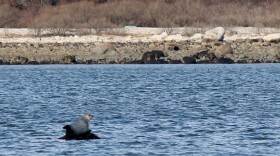-
For $10, the Rhode Island Society for the Prevention of Cruelty to Animals’ cats will quite literally do their business on a pink paper heart bearing your chosen name.
-
The K9 Adventure Club organizes free group walks each Sunday, allowing dogs and their owners the opportunity to explore new places.
-
Both the Center for Coastal Studies and the New England Aquarium report observing dozens of North Atlantic right whales returning to local waters over the past week.
-
Seals and migratory birds are the stars of the show on Long Island Sound.
-
A winter wildlife cruise with Norwalk’s Maritime Aquarium gives folks a closer look at seals, the only marine mammal to make an annual visit to the Sound.
-
The end of the holiday season has an unlikely beneficiary: goats.
-
Some dogs have an amazing ability to learn the names of dozens, even hundreds of toys. Now, a new study suggests these super learners can pick up new words by overhearing people talk, just as toddlers can.
-
“We can look inside things like a clam or a shark in a way that we haven't previously been able to look at them,” one veterinarian said.
-
Human-bear conflicts are on the rise in Connecticut.
-
The addiction recovery program in Gardner, Mass., is part animal sanctuary, part therapy center. The men who stay there get assigned to care for one of dozens of animals — from chickens, pigs, goats and even ponies — as part of their treatment.
Play Live Radio
Next Up:
0:00
0:00
Available On Air Stations










